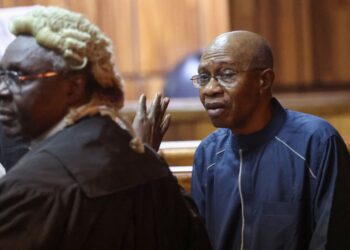Financial experts in Nigeria have called on the federal government to explore the option of Public Private Partnership (PPP) in tackling the country’s infrastructural challenges. They also emphasized the need for caution regarding new borrowings to avoid further debt accumulation. These experts shared their opinions in separate interviews with the News Reporters in Lagos.
Dr. Uju Ogubunka, a former Executive Secretary of the Chartered Institute of Bankers of Nigeria (CIBN), highlighted the potential of PPP as an innovative approach to addressing infrastructural gaps without incurring additional debts. He emphasized that PPP could provide a solution to the current infrastructural dearth caused by insufficient fiscal revenue. Ogubunka suggested that reducing the cost of governance across all levels of government would free up funds for infrastructure development.
Ogubunka also emphasized the importance of stopping wastages in governance and reducing the reliance on borrowings from international lenders. By adopting cost-saving measures, the government can reallocate resources to more productive areas of society, thereby reducing the need for excessive borrowing.
Mr. Godwin Anono, the President of the Standard Shareholders Association of Nigeria, echoed the sentiment that the government should reduce the rate of borrowing due to the worrisome dimension of the country’s debt stock. Anono suggested that all three tiers of government should focus on improving internal revenue generation instead. He emphasized the untapped revenue potential in each state, which, if harnessed effectively, could benefit the entire country.
Anono also suggested that the Federal Government could leverage the Infrastructural Company of Nigeria, which is designed to facilitate private sector funding for public infrastructure projects. This approach, he believes, will stimulate growth and provide the necessary infrastructure to unlock the country’s natural resources and enhance the lives of its citizens.
Mr. Sunny Nwosu, the founder of the Independent Shareholders Association of Nigeria, added that the government should have the political will to sell certain state-owned assets to increase revenues. Nwosu emphasized the presence of redundant national assets that contribute to government overheads without any economic viability. Evaluating and concessioning these assets or outrightly selling them, according to Nwosu, would boost revenues and alleviate the need for additional borrowing.
It is important to note that Nigeria’s total public debt recently rose to N82 trillion following the unification of the naira’s exchange rate. The Central Bank of Nigeria’s operational changes to the foreign exchange market led to the depreciation of the naira and an automatic increase in public debt. The conversion of the dollar portion of the debt, estimated at about $41.6 billion, contributed to the increase in the total public debt.
The call for exploring PPP, reducing borrowings, improving internal revenue generation, and selling state-owned assets reflects the experts’ concerns about Nigeria’s rising debt and the need for alternative approaches to address infrastructural challenges. The implementation of these recommendations could pave the way for sustainable economic growth and development in the country.










